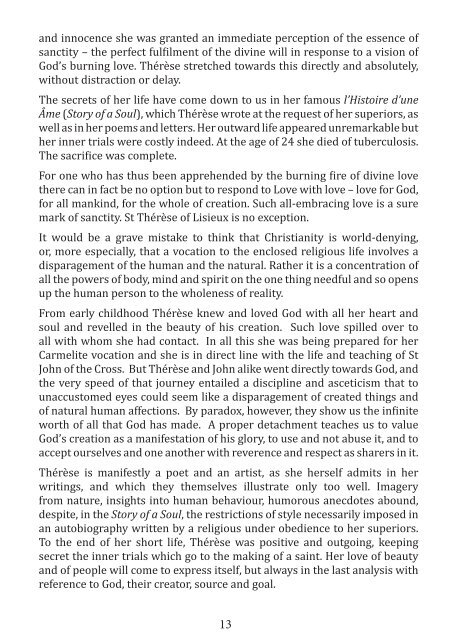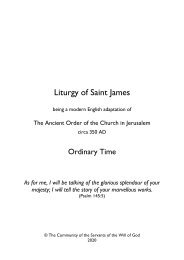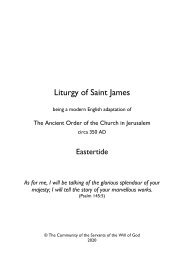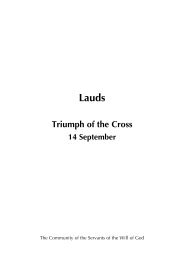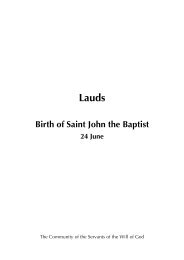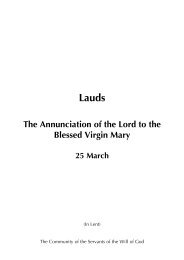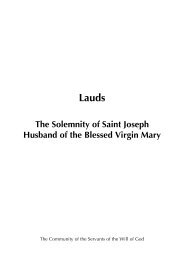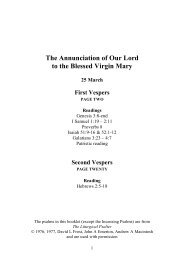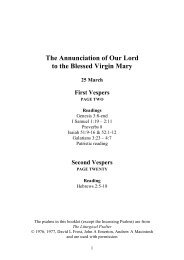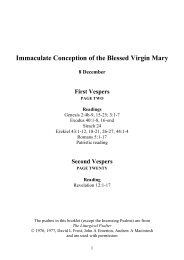In Praise of Holy Women
'Come to the Father' is the official journal of the Anglican Community of the Servants of the Will of God, Sussex, England, a contemplative monastic order for men and women founded in 1938. The aim of the journal is to maintain a dialogue between the Churches - East and West. This issue features articles on Evelyn Underhill, Julia DeBeausobre, Therese of Lisieux, Sister Joanna Reitlinger and Dorothy Day.
'Come to the Father' is the official journal of the Anglican Community of the Servants of the Will of God, Sussex, England, a contemplative monastic order for men and women founded in 1938. The aim of the journal is to maintain a dialogue between the Churches - East and West. This issue features articles on Evelyn Underhill, Julia DeBeausobre, Therese of Lisieux, Sister Joanna Reitlinger and Dorothy Day.
You also want an ePaper? Increase the reach of your titles
YUMPU automatically turns print PDFs into web optimized ePapers that Google loves.
and innocence she was granted an immediate perception <strong>of</strong> the essence <strong>of</strong><br />
sanctity – the perfect fulfilment <strong>of</strong> the divine will in response to a vision <strong>of</strong><br />
God’s burning love. Thérèse stretched towards this directly and absolutely,<br />
without distraction or delay.<br />
The secrets <strong>of</strong> her life have come down to us in her famous l’Histoire d’une<br />
Âme (Story <strong>of</strong> a Soul), which Thérèse wrote at the request <strong>of</strong> her superiors, as<br />
well as in her poems and letters. Her outward life appeared unremarkable but<br />
her inner trials were costly indeed. At the age <strong>of</strong> 24 she died <strong>of</strong> tuberculosis.<br />
The sacrifice was complete.<br />
For one who has thus been apprehended by the burning fire <strong>of</strong> divine love<br />
there can in fact be no option but to respond to Love with love – love for God,<br />
for all mankind, for the whole <strong>of</strong> creation. Such all-embracing love is a sure<br />
mark <strong>of</strong> sanctity. St Thérèse <strong>of</strong> Lisieux is no exception.<br />
It would be a grave mistake to think that Christianity is world-denying,<br />
or, more especially, that a vocation to the enclosed religious life involves a<br />
disparagement <strong>of</strong> the human and the natural. Rather it is a concentration <strong>of</strong><br />
all the powers <strong>of</strong> body, mind and spirit on the one thing needful and so opens<br />
up the human person to the wholeness <strong>of</strong> reality.<br />
From early childhood Thérèse knew and loved God with all her heart and<br />
soul and revelled in the beauty <strong>of</strong> his creation. Such love spilled over to<br />
all with whom she had contact. <strong>In</strong> all this she was being prepared for her<br />
Carmelite vocation and she is in direct line with the life and teaching <strong>of</strong> St<br />
John <strong>of</strong> the Cross. But Thérèse and John alike went directly towards God, and<br />
the very speed <strong>of</strong> that journey entailed a discipline and asceticism that to<br />
unaccustomed eyes could seem like a disparagement <strong>of</strong> created things and<br />
<strong>of</strong> natural human affections. By paradox, however, they show us the infinite<br />
worth <strong>of</strong> all that God has made. A proper detachment teaches us to value<br />
God’s creation as a manifestation <strong>of</strong> his glory, to use and not abuse it, and to<br />
accept ourselves and one another with reverence and respect as sharers in it.<br />
Thérèse is manifestly a poet and an artist, as she herself admits in her<br />
writings, and which they themselves illustrate only too well. Imagery<br />
from nature, insights into human behaviour, humorous anecdotes abound,<br />
despite, in the Story <strong>of</strong> a Soul, the restrictions <strong>of</strong> style necessarily imposed in<br />
an autobiography written by a religious under obedience to her superiors.<br />
To the end <strong>of</strong> her short life, Thérèse was positive and outgoing, keeping<br />
secret the inner trials which go to the making <strong>of</strong> a saint. Her love <strong>of</strong> beauty<br />
and <strong>of</strong> people will come to express itself, but always in the last analysis with<br />
reference to God, their creator, source and goal.<br />
13


